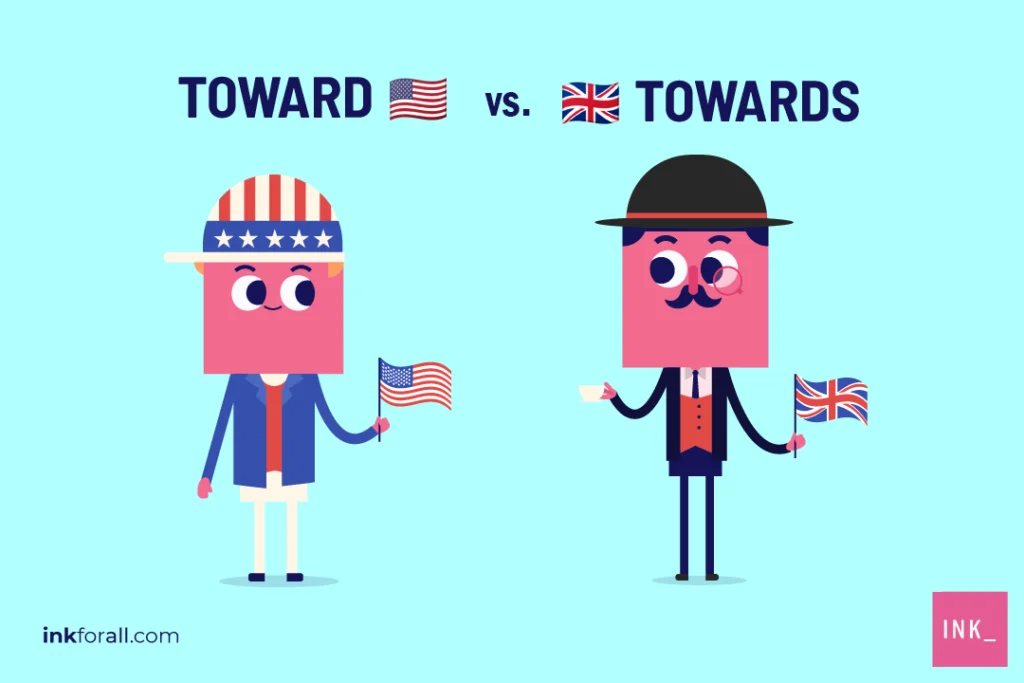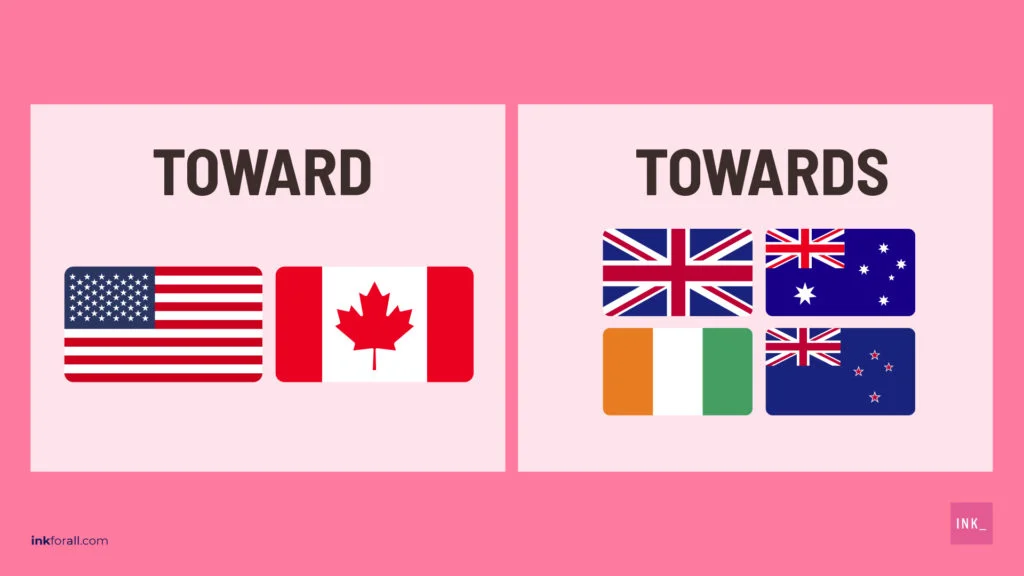Не понимаете, в чем разница между предлогами towards и toward? Не знаете, что выбрать: toward(s) или to? Тогда скорее читайте эту статью, потому что сегодня вместе с вами я буду разбирать все особенности употребления этих слов.
Содержание:
I. Разница между TOWARD или TOWARDS
II. Употребление предлога TOWARD(S)
III. Разница между TO и TOWARD(S)
Разница между TOWARD или TOWARDS
Прежде всего, расставим все точки над «i»: предлоги towards и toward равнозначны и взаимозаменяемы, но чаще всего форма towards употребляется в британском английском, а toward – в американском и канадском.
Употребление предлога TOWARD(S)
В первую очередь предлог toward(s) является предлогом движения (направления). Самое распространенное его значение – «по направлению к».
We were walking toward(s) the house.
Мы шли по направлению к дому.
The trend toward(s) healthier eating is becoming more and more widespread.
Тенденция к здоровому питанию становится все более широко распространенной.
Мы также используем toward(s) в значении «близко к чему-то» (близко к какому-то месту или близко ко времени). Давайте посмотрим примеры:
My room was toward(s) the back of the house.
Моя комната располагалась ближе к задней части дома.
I just go to bed toward(s) the early morning.
Я ложусь спать только ближе к раннему утру.
Другое значение предлога toward(s) – «по отношению» к кому-либо или чему-либо. Он употребляется, если речь идет о чувствах, поведении людей по отношению друг к другу или к чему-то.
I remember my teacher who has always been very friendly toward(s) me.
Я помню свою учительницу, которая всегда относилась ко мне дружелюбно.
The press is biased toward(s) this issue.
Пресса относится предвзято к этой проблеме.
Если же ситуация подразумевает достижение чего-то значимого или покупку чего-либо, то мы также используем toward(s).
My friend has given me some money toward(s) apartment purchase.
Мой друг дал мне некоторую сумму денег на покупку квартиры.
We are advancing toward(s) the goal of achieving universal access to basic education.
Мы продвигаемся к достижению цели всеобщего доступа к начальному образованию.
Попробуйте перевести текст на картинке. О чем говорит Мардж?
Разница между TO и TOWARD(S)
Предлоги to и toward(s) схожи. Как минимум они относятся к группе предлогов направления. Но тем не менее между ними есть существенные различия.
Как вы могли заметить, слово toward(s) состоит из частицы to- и суффикса -wards, который означает «зона, округ, место». В английском языке существует целый ряд слов с таким суффиксом: backward(s), forward, upward(s), downward(s). Особенно часто они употребляются в художественной литературе.
Что касается употребления to в английском языке, то я уже подробно разбирала его в этой статье. Так в чем же разница между to и toward(s)?
Предлог to отвечает на вопрос «Куда?» и переводится как «в, на, к». Он подразумевает под собой перемещение из точки А в точку Б, где точка Б является конечной целью движения.
We are going to Rome next week.
Мы поедем в Рим на следующей неделе.
She went to the bank last Friday.
Она ходила в банк в прошлую пятницу.
Toward(s) отвечает на вопрос «В каком направлении?». Используя его, мы имеем в виду перемещение из точки А по направлению к точке Б, но точка Б либо не является конечной целью, либо она оказывается недостигнутой по какой-то причине. Объясню на примерах:
I was walking toward(s) the house when Mary stopped me.
Я шел по направлению к дому, когда Мэри остановила меня. (Точка «дом» не достигнута, так как Мэри помешала.)
Go toward(s) that house and then turn left.
Идите по направлению к тому дому, а затем поверните налево. (Дом не является конечной точкой назначения.)
Скачайте подборку статей о предлогах в английском
и найдите ответы на свои вопросы!
Вы встретите еще много предлогов направления и движения в английском языке, которые требуют повышенного внимания. Самостоятельно разобраться с ними не так-то просто, и лучше это делать в команде единомышленников и профессионального преподавателя. Записывайтесь прямо сейчас на мой комплексный курс английского Will Speak и начните достигать свою цель вместе с нами!
Ваша Полина Червова,
основатель школы Will Speak
к, в направлении, по отношению к, по направлению к, навстречу, для, около
предлог
- к, по направлению к
- к, по отношению к
- для; с тем, чтобы
- приблизительно, около, примерно
- к, к моменту
Мои примеры
Словосочетания
Примеры с переводом
She took a step toward the door. 
Она сделала шаг к двери.
I turned towards home. 
Я повернул по направлению к дому.
He had spoken towards an hour. 
Он выступал около часа.
The bus is heading toward town. 
Автобус движется в сторону города.
He was standing with his back towards me. 
Он стоял спиной ко мне.
All the windows face toward the river. 
Все окна выходят в сторону реки /на реку/.
He noticed two policemen coming towards him. 
Он заметил двух полицейских, направляющихся к нему.
ещё 10 примеров свернуть
Возможные однокоренные слова
toward — к, в направлении, около, происходящий, послушный
towardly — благоприятный, сулящий удачу, послушно, покорно
These examples may contain rude words based on your search.
These examples may contain colloquial words based on your search.
Suggestions
+10k
+10k
+10k
7599
5795
5345
4664
The same drives that we see towards ubiquity, towards diversity, towards socialization, towards complexity.
It is a step not merely towards Socialism but towards Communism.
We have no malicious intention towards anyone.
Мы не имеем никаких недоброжелательных намерений в отношении кого бы то ни было.
He was not hostile towards anyone.
У него нет враждебности по отношению к кому бы то ни было.
Discrimination against or hostility towards other races.
Дискриминация других рас или антагонизм, враждебность по отношению к другим расам».
You may have resentment towards him.
А, у вас по отношению к нему может быть чувство жалости.
He was not malicious towards other people.
Но он не был способен на какие-то подлости по отношению к другим людям.
They are helpful and thoughtful towards them.
Они нуждаются в вашей помощи, в добром и бережном отношении к ним.
She meant no ill-will towards the hairstylist.
При этом она уточнила, что не испытывает злобы по отношению к Волочковой.
As individuals we have a certain responsibility, towards ourselves and towards others.
Нет, как индивидуумы, мы имеем определенную ответственность перед самими собой и по отношению к другим.
The countries remain committed to meeting their obligations towards the Tribunal and towards justice.
Все эти страны неизменно привержены как выполнению возложенных на них обязательств перед МТБЮ, так и делу правосудия.
We must redirect our focus towards the individual’s well-being, towards human-centred social and economic development, towards better protection against human rights violations.
Мы должны переориентировать наше внимание на достижение благосостояния каждой отдельной личности, на социальное и экономическое развитие в интересах человека, на лучшую защиту прав человека и недопущение их нарушений.
This is irresponsible behavior both towards your kids and towards your own time and work.
Это безответственное поведение как по отношению к вашим детям, так и по отношению к вашему собственному времени и работе.
She tells of much anger towards her mother, but has never been able to express this towards her directly.
Она рассказывает про гнев по отношению к своей матери, но она никогда не могла выразить его к ней непосредственно.
He tries to apply every day his caring nature towards the entire staff and most importantly towards the patients.
Стремится каждый день проявлять свой заботливый характер по отношению ко всему персоналу и, самое главное, к пациентам.
On the contrary, the trend is towards ever fuller realization of this right and towards higher-quality and more effective teaching.
Наоборот, осуществляется курс на все более полную реализацию этого права, повышение качества и эффективности обучения.
Capacity-building and preventive measures at the national level contribute greatly towards reducing the vulnerability of disaster-prone countries and encouraging an effective transition towards development.
Принимаемые на национальном уровне меры по укреплению потенциалов и предупреждению в значительной степени способствуют уменьшению уязвимости стран, подверженных чрезвычайным бедствиям, и благоприятствуют эффективному переходу к этапу развития.
This is a very important step not only towards non-proliferation but also towards global nuclear disarmament.
Это — очень важный шаг не только по пути к нераспространению, но и по пути к глобальному ядерному разоружению.
My delegation is strongly supportive of all efforts towards nuclear disarmament and the recent events constitute a serious setback towards achievement of these efforts.
Моя делегация решительно поддерживает все усилия по ядерному разоружению, и недавние события представляют собой серьезный откат по отношению к этим усилиям.
Suggestions that contain towards
Results: 160962. Exact: 160962. Elapsed time: 275 ms.
Documents
Corporate solutions
Conjugation
Synonyms
Grammar Check
Help & about
Word index: 1-300, 301-600, 601-900
Expression index: 1-400, 401-800, 801-1200
Phrase index: 1-400, 401-800, 801-1200
Main Toward vs. Towards Takeaways:
- When toward and towards are prepositions, they have the same meaning. They are interchangeable.
- The only difference between toward and towards as prepositions is regional.
- Toward is preferred in the U.S. and Canada, while Australia and the United Kingdom typically use towards.
- Both toward and towards mean “in the direction of.” They can also indicate relation or purpose.
- However, when an adjective, only toward (no ‘S’) is correct. This usage is rare.
Should you walk toward the museum or towards it? Have your feelings changed toward or towards your ex? As prepositions, both words are acceptable. The only difference between them is where each is commonly used.
What is the Difference Between Toward and Towards?
As a preposition, toward and towards are both correct. The only real difference between the two words is the letter ‘S’ at the end. Traditionally, toward (no ‘S’) is more common in the U.S. and Canada. Meanwhile, towards (with the ‘S’) is more common in Australia and the United Kingdom. Towards is also the preferred term for informal conversations in the U.S., especially in the south. Regardless of which spelling you choose, both words have the same meaning. However, when an adjective, only towardis correct.
What Does Toward Mean?
As a preposition, toward is a directional word. As a result, towardmeans in the direction of. Figuratively, it can mean in relation to or for the purpose of. Rarely, toward can be an adjective instead. In this case, toward references something that is going on or in progress. Toward and towards are interchangeable as prepositions.However, when toward is an adjective, don’t add an ‘s’ at the end of the word.
Towarddefinition:(preposition) in the direction of; in relation to; for the purpose of
Towardsdefinition:(preposition) in the direction of; in relation to; for the purpose of
Is There Such a Word as Towards?
Yes, towards is a real word and it can be used interchangeably with toward. Towardsandtoward function as prepositions in sentences. They both refer to the direction of someone or something. Both terms could also mean close in location or time.
The only difference between towards and toward is that towards is commonly used in British English. Meanwhile, toward is favored in American English. Other than that, these two words hold the same meaning and function.
Is Towards Plural?
Towards (with an ‘S’) is not plural. Typically, nouns can be singular or plural. Since towards is usually a preposition (and rarely, an adjective), it can’t be plural. Therefore, the difference between toward vs. towards is not singular vs. plural. In fact, it’s not grammatical at all. Instead, the difference is regional. For example, toward without an ‘S’ is more North American but towards with an ‘S’ is more British. Both are correct and interchangeable.
How Do You Use Towards in a Sentence?
Here are examples of how to use towards in a sentence:
Since towards is acting as a preposition in all of the above examples, you could easily use toward instead.
Use toward ortowards in a sentence when you need to express direction, a relationship, or purpose. Remember that you always need an object with these words because toward and towards are prepositions.
Remember, your sentence formula should always be toward(s) + object. An object is a noun or pronoun affected by a preposition or verb.
Can You End a Sentence with Toward?
When toward is acting as a preposition, it’s best to avoid ending a sentence with toward. This is because, traditionally, it’s bad grammatical form to end a sentence on a preposition. That said, if you are writing a formal document, essay, or paper, avoid ending a sentence on a preposition. However, if you are speaking informally or writing an informal note, email, or text, it’s okay to break this “rule.” Conversely, when toward is acting as an adjective, it can (and usually does) come at the end of a sentence.
Toward and towards can be used interchangeably as prepositions. But as an adjective, only toward (no ‘S’) is correct.
What Does Geared Towards Mean?
When someone uses the phrase “geared towards,” they mean something is intended for a particular purpose or audience. You can also say “geared toward.”
Sometimes English speakers say “geared to” instead of “geared toward,” but that’s usually not grammatically correct.
What are Some Synonyms for Toward?
Synonyms for toward include “approaching,” “proceeding,” “via,” “facing,” and “against.” There are also some phrases you can replace toward with, including:
- in the direction of
- in the vicinity
- not quite
- on the road to
- in relation to
- close to
- shortly before
These phrases aren’t always exact substitutes for toward or towards. It depends on how you use the preposition in your sentence.
How Do You Say Toward?
You can pronounce toward like tord, tawrd, or tuh-word. Some people also say tword.
There is not an ‘r’ sound in the first part of toward, but some people mispronounce the word as tor-word. You may also hear it pronounced like tow-word with a long ‘o,’ but this is incorrect.
Think of the word toured to help yourself remember how to say toward. Though spelled differently, both words have similar pronunciations.
Remember: either version is acceptable when you’re using the word as a preposition. Stick with toward when you need an adjective.
Quick Toward vs. Towards Grammar Quiz
Toward vs. Towards Question #1
A. Adjective
B. Verb
C. Preposition
D. Adverb
Correct!
Wrong!
The answer is C. “Toward” is a preposition that means «in the direction of.» It can also indicate relation or purpose.
Toward or Towards Question #2
A. «Towards» is the preferred form in the U.S.
B. “Toward” and “towards” have the same meaning.
C. Both are not true.
Correct!
Wrong!
The answer is A. “Toward” is the preferred form in the U.S.
Toward or Towards Question #3
A. A toward breeze helped the ship to shore.
B. A towards breeze helped the ship to shore.
Correct!
Wrong!
The answer is A. When using toward as an adjective, don’t add an “s” at the end of the word.
Toward or Towards Question #4
A. Approaching
B. In the direction of
C. Away from
D. Close to
Correct!
Wrong!
The answer is C. «Away from» is the opposite of «toward.»
Read More: Grey Or Gray: One Color, Two Spellings
Table of Contents
- How can I use the word toward in a sentence?
- How do you use the word towards?
- What type of word is toward?
- What is the old word for towards?
- What is the root word of towards?
- What does the suffix AD stand for?
- What is the root word of Cede?
- What does the root word Miss mean?
- What is MIT in commit?
- Is Mort Greek or Latin?
- Is Phil Latin or Greek?
- Is NYM Greek or Latin?
- What does Nim mean?
- Is a Greek word means same name?
- What are Homographs examples?
- Is present a Homograph?
- Is duck a Homograph?
- Is Heteronyms and Homographs the same?
- What do you call words that sound the same?
- What is it called when you spell a word like it sounds?
- How do you show how words are pronounced?
towards preposition (MOVEMENT) in the direction of, or closer to someone or something: She stood up and walked towards him.
How can I use the word toward in a sentence?
Toward sentence example
- He took a step toward her.
- As they continued toward the house, he cleared his throat.
- He shouted at Pete, and ran toward Cassie.
- I slipped from my mother’s lap and almost ran toward them.
- “Why, they are driving us toward the Black Pit, into which they threatened to cast us,” replied the kitten.
How do you use the word towards?
The only difference between toward and towards is the s. Both spellings are correct, and they mean the same thing: in the direction of. Toward is the preferred spelling in the United States and Canada. In other English-speaking countries, such as the United Kingdom and Australia, towards is the more common spelling.
What type of word is toward?
preposition
What is the old word for towards?
| English | Old English |
|---|---|
| towards | ongan; ongean; ongegn; togeanes; toweard; to … weard; weard; wiþ; wiþ … weard |
What is the root word of towards?
The English prefix ad- means “to, towards.” Examples using this prefix include admit and adjust. An easy way to remember that the prefix ad- means “towards” is through the word advertise, for when you advertise you try to turn potential buyers “towards” the product you are selling.
Definition for ad (5 of 12) a suffix meaning “derived from,” “related to,” “concerned with,” “associated with” (oread), introduced in loanwords from Greek (Olympiad; oread), used sporadically in imitation of Greek models, as Dunciad, after Iliad.
What is the root word of Cede?
-cede-, root. -cede- comes from Latin, where it has the meaning “go away from; withdraw; yield. ” This meaning is found in such words as: accede, antecedent, cede, concede, precede, precedent, recede, secede.
What does the root word Miss mean?
The English root mit and its variant miss comes from a Latin word that means ‘to send. ‘
What is MIT in commit?
-mit- comes from Latin, where it has the meaning “send. This meaning is found in such words as: admit, commit, committee, emit, intermittent, noncommittal, omit, permit, remit, remittance, submit, transmit.
Is Mort Greek or Latin?
The Latin root word mort means “death.” This Latin root is the word origin of a good number of English vocabulary words, including mortgage, mortuary, and immortal. The Latin root word mort is easily recalled through the word mortal, for a “mortal” is someone whom “death” will claim one day.
Is Phil Latin or Greek?
#1 phil → love The root word phil comes from a Greek verb meaning to love. Some common words derived from phil are philosopher, philanthropist, and bibliophile.
Is NYM Greek or Latin?
“Nym” derives from the Greek word for name or word.
Net interest margin
Is a Greek word means same name?
The word homonym comes from the Greek ὁμώνυμος (homonymos), meaning “having the same name”, which is the conjunction of ὁμός (homos), “common, same, similar ” and ὄνομα (onoma) meaning “name”. Thus, it refers to two or more distinct concepts sharing the “same name” or signifier.
What are Homographs examples?
A homograph (from the Greek: ὁμός, homós, “same” and γράφω, gráphō, “write”) is a word that shares the same written form as another word but has a different meaning….More examples.
| Word | Example of first meaning | Example of second meaning |
|---|---|---|
| wind | The wind /wɪnd/ howled through the woodlands. | Wind /waɪnd/ your watch. |
Is present a Homograph?
‘Present’ is an example of a homograph – a group of words that have two different pronunciations and two different meanings. Do you know the difference between ‘present’ as a verb and noun? The verb is pronounced ‘pre-SENT’. It means to give or provide something.
Is duck a Homograph?
The word homonym means, roughly, “same name.” According to the Oxford English Grammar, homonyms are “distinct words that happen to have the same form.” And they’re pronounced the same, too. So when you see a duck and when you duck your head, those are homonyms.
Is Heteronyms and Homographs the same?
Description. A heteronym is a homograph that is not a homophone, a word that has a different pronunciation and meaning from another word with the same spelling. Heteronym pronunciation may vary in vowel realisation, in stress pattern, or in other ways.
What do you call words that sound the same?
Homonyms are words which sound alike or are spelled alike. In a strict sense, a homonym is a word that both sounds and is spelled the same as another word.
What is it called when you spell a word like it sounds?
Onomatopoeia (also onomatopeia in American English), is the process of creating a word that phonetically imitates, resembles, or suggests the sound that it describes.
How do you show how words are pronounced?
Syllables are separated by hyphens (“-“). The stress on a syllable is indicated by capital letters. For example, the word “pronunciation” (/prəˌnʌnsiˈeɪʃən/) is respelled prə-NUN-see-AY-shən.





